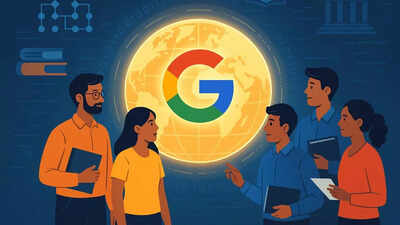2025 Google PhD Fellowship Recognizes Indian Scholars for Research Aligned with Sustainable Development Goals
Google has announced the recipients of its 2025 PhD Fellowship, with 10 scholars from Indian institutions among those selected. The fellowship acknowledges doctoral students engaged in advanced research across computer science and related fields. The work of these scholars demonstrates significant alignment with several United Nations Sustainable Development Goals (SDGs), particularly in areas of innovation, health, education, and sustainable infrastructure.
Advancing Global Goals Through Technological Innovation
Fostering Innovation and Quality Education (SDG 9 & SDG 4)
The fellowship directly supports SDG 9 (Industry, Innovation, and Infrastructure) by funding research that drives technological advancement. By recognizing and supporting doctoral candidates from premier institutions such as the Indian Institute of Science (IISc) and various Indian Institutes of Technology (IITs), the program also contributes to SDG 4 (Quality Education), promoting inclusive and equitable quality education and lifelong learning opportunities for all.
Enhancing Health and Well-being (SDG 3)
Research in specialized fields such as Health Research is a direct contributor to SDG 3 (Good Health and Well-being). Furthermore, advancements in Machine Learning and Artificial Intelligence, key areas of focus for several fellows, have profound implications for medical diagnostics, treatment personalization, and public health management, thereby supporting the goal of ensuring healthy lives.
Building Sustainable and Secure Digital Infrastructure (SDG 9, SDG 11 & SDG 16)
The research conducted by the fellows in areas like Networking, Privacy, and Human-Computer Interaction is fundamental to building resilient and sustainable infrastructure (SDG 9). These technologies are critical for developing smart, inclusive, and safe cities (SDG 11) and for creating effective, accountable, and transparent institutions at all levels, including secure digital platforms (SDG 16).
Profile of Indian Recipients and Their SDG-Related Research Areas
The selected scholars from India and their research areas, which correspond to key SDGs, are as follows:
- Arpita Biswas – Algorithms, Indian Institute of Science (IISc) | Contribution to SDG 9: Fostering Innovation
- Aniruddha Singh Kushwaha – Networking, IIT Bombay | Contribution to SDG 9 & SDG 11: Building Resilient Infrastructure and Sustainable Cities
- Anirban Santara – Machine Learning, IIT Kharagpur | Contribution to SDG 3 & SDG 9: Advancing Health and Industry Innovation
- Nilesh Kumar Sahu – Health Research, IISER Bhopal | Contribution to SDG 3: Ensuring Good Health and Well-being
- Gonugunta Venkata Sai Mothish – Machine Perception, IISc | Contribution to SDG 9: Fostering Innovation
- Mohammed Safi Ur Rahman Khan – Natural Language Processing, IIT Madras | Contribution to SDG 4 & SDG 9: Improving Access to Information and Fostering Innovation
- Gayatri Priyadarsini Kancherla – Privacy, Safety & Security, IIT Gandhinagar | Contribution to SDG 16: Promoting Peace, Justice, and Strong Institutions
- Namasivayam Kalithasan – Machine Learning Foundations, IIT Delhi | Contribution to SDG 9: Fostering Innovation
- Khushboo Agrawal – Software Engineering, IIT Kanpur | Contribution to SDG 9: Building Resilient Infrastructure
- Siddharth Shrivastava – Human-Computer Interaction, IIT Hyderabad | Contribution to SDG 11: Making Cities and Human Settlements Inclusive
Fellowship Overview and Global Collaboration (SDG 17)
The Google PhD Fellowship program provides financial support, mentorship from Google researchers, and access to research infrastructure. This initiative exemplifies SDG 17 (Partnerships for the Goals) by fostering a global partnership between the private sector and academic institutions to advance scientific research. The inclusion of fellows from North America, Europe, Africa, and Asia underscores the program’s commitment to global collaboration. India’s consistent and significant representation highlights the nation’s growing role in the global research ecosystem and its contribution to achieving the Sustainable Development Goals through technological innovation.
Identified Sustainable Development Goals (SDGs)
-
SDG 4: Quality Education
The article directly relates to SDG 4 by focusing on a prestigious PhD Fellowship program. This initiative supports higher education and advanced research, which are crucial components of quality education. The fellowship provides “financial support, mentorship, and networking opportunities” to doctoral students, thereby promoting access to high-level academic pursuits.
-
SDG 9: Industry, Innovation, and Infrastructure
The fellowship encourages “cutting-edge research in computer science and related disciplines” such as AI, machine learning, and quantum computing. This directly supports innovation and enhances scientific research. By recognizing and funding researchers, including “10 Indian scholars,” the program contributes to building the technological and research capacity, particularly in a developing country, reflecting “India’s growing influence in the global technology research landscape.”
-
SDG 5: Gender Equality
Although not the central theme, the article implicitly touches upon SDG 5. The list of Indian recipients includes female scholars like Arpita Biswas, Gayatri Priyadarsini Kancherla, and Khushboo Agrawal. Their inclusion in a highly competitive, male-dominated field like computer science research signifies progress towards ensuring women’s full participation and equal opportunities in science and technology.
-
SDG 17: Partnerships for the Goals
The Google PhD Fellowship is a prime example of a multi-stakeholder partnership. It represents a collaboration between the private sector (Google) and academic institutions (“leading universities across the world”) to advance a common goal. The article highlights that the program fosters “global collaboration and diversity” by including recipients from “North America, Europe, Africa, and Asia,” thereby mobilizing knowledge, expertise, and financial resources to support sustainable development through innovation.
-
SDG 3: Good Health and Well-being
The article mentions that the fellowship covers a wide range of research areas, specifically including “Health Research.” One of the Indian recipients, Nilesh Kumar Sahu, is explicitly recognized for his work in this field. This demonstrates a direct link to advancing health outcomes through technological and scientific research.
Specific SDG Targets
-
Target 4.b (Expand scholarships for developing countries)
This target aims to “substantially expand globally the number of scholarships available to developing countries… for enrolment in higher education, including… information and communications technology, science and engineering programmes.” The article’s focus on the “10 Indian scholars” selected for the Google PhD Fellowship in computer science and related fields is a direct manifestation of this target being met.
-
Target 9.5 (Enhance scientific research)
This target calls for enhancing scientific research and increasing the number of research and development workers. The fellowship program is designed to “support promising doctoral students pursuing cutting-edge research,” which directly contributes to this goal by nurturing the next generation of R&D professionals and advancing academic innovation.
-
Target 5.b (Enhance the use of enabling technology to promote the empowerment of women)
This target focuses on using technology to empower women. By supporting female researchers in high-tech fields like “Algorithms,” “Privacy, Safety & Security,” and “Software Engineering,” the fellowship empowers women to become leaders and innovators in the technology sector, thereby contributing to this target.
-
Target 17.16 (Enhance the Global Partnership for Sustainable Development)
This target promotes multi-stakeholder partnerships that mobilize and share knowledge and financial resources. The Google PhD Fellowship program, as a collaboration between a tech giant and global universities, exemplifies this partnership model, sharing resources to “support exceptional PhD students pursuing original and impactful research.”
Relevant Indicators
-
Indicator for Target 4.b: Number of scholarships awarded by sector and country.
The article provides a specific, quantifiable indicator: “10 Indian scholars” were awarded the fellowship. This number serves as a direct measure of scholarships being provided to a developing country (India) in the ICT/science sector.
-
Indicator for Target 9.5: Researchers (in full-time equivalent) per million inhabitants.
While not providing a national total, the article implies an increase in high-level researchers by highlighting the support for “exceptional PhD candidates.” The 10 Indian scholars represent an addition to the pool of R&D personnel in India, contributing to this indicator.
-
Indicator for Target 5.b: Proportion of women among fellowship recipients in STEM fields.
The article allows for the calculation of an implied indicator. By naming the recipients, it can be determined that 3 out of the 10 Indian scholars are women (Arpita Biswas, Gayatri Priyadarsini Kancherla, Khushboo Agrawal), representing a 30% proportion, which can be used to measure female participation in advanced technology research.
-
Indicator for Target 3.d: Number of researchers in health-related technology fields.
The article explicitly mentions “Nilesh Kumar Sahu – Health Research,” providing a specific data point (one researcher) contributing to the capacity for health innovation.
Summary Table: SDGs, Targets, and Indicators
| SDGs | Targets | Indicators (as identified in the article) |
|---|---|---|
| SDG 4: Quality Education | Target 4.b: Substantially expand globally the number of scholarships available to developing countries for enrolment in higher education, particularly in ICT and science. | The specific number of fellowships awarded to students from a developing country: “10 Indian scholars.” |
| SDG 9: Industry, Innovation, and Infrastructure | Target 9.5: Enhance scientific research and increase the number of research and development workers. | The number of doctoral students supported in “cutting-edge research,” contributing to the pool of R&D personnel. |
| SDG 5: Gender Equality | Target 5.b: Enhance the use of enabling technology, in particular information and communications technology, to promote the empowerment of women. | The proportion of women among the Indian fellowship recipients (3 out of 10, or 30%), indicating female participation in advanced technology fields. |
| SDG 17: Partnerships for the Goals | Target 17.16: Enhance the global partnership for sustainable development, complemented by multi-stakeholder partnerships. | The existence of the Google PhD Fellowship program as a private sector-academia partnership supporting global research. |
| SDG 3: Good Health and Well-being | Target 3.d: Strengthen the capacity of all countries… for management of national and global health risks. | The number of researchers supported in the specific field of “Health Research” (e.g., Nilesh Kumar Sahu). |
Source: timesofindia.indiatimes.com







